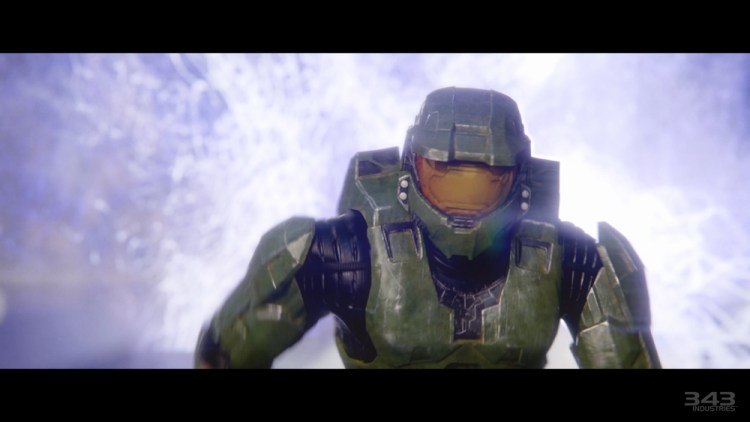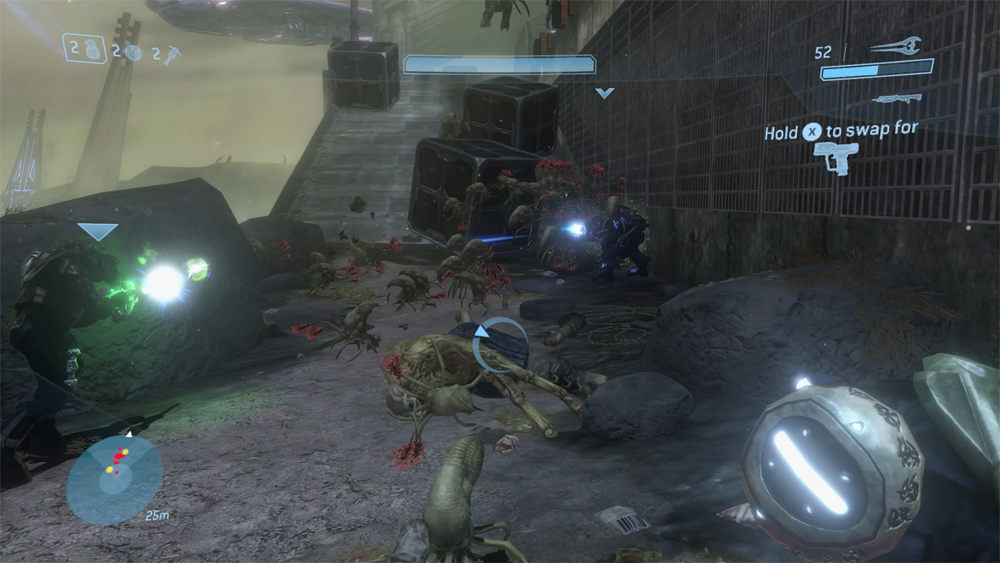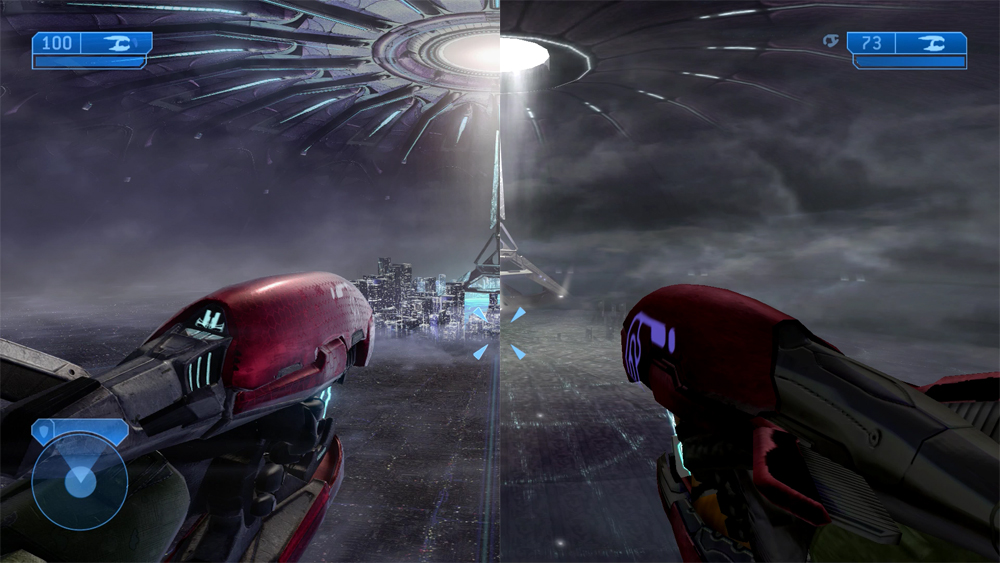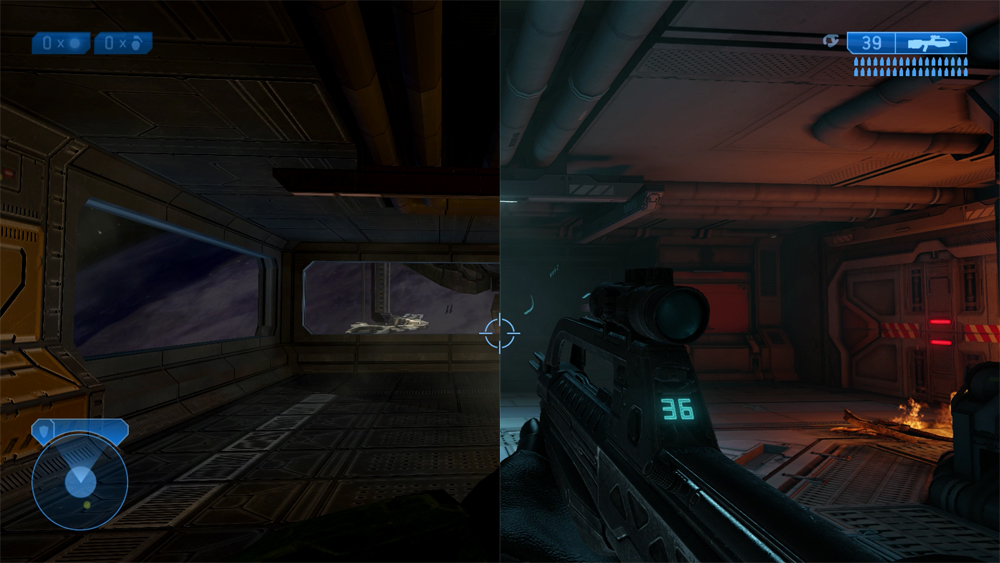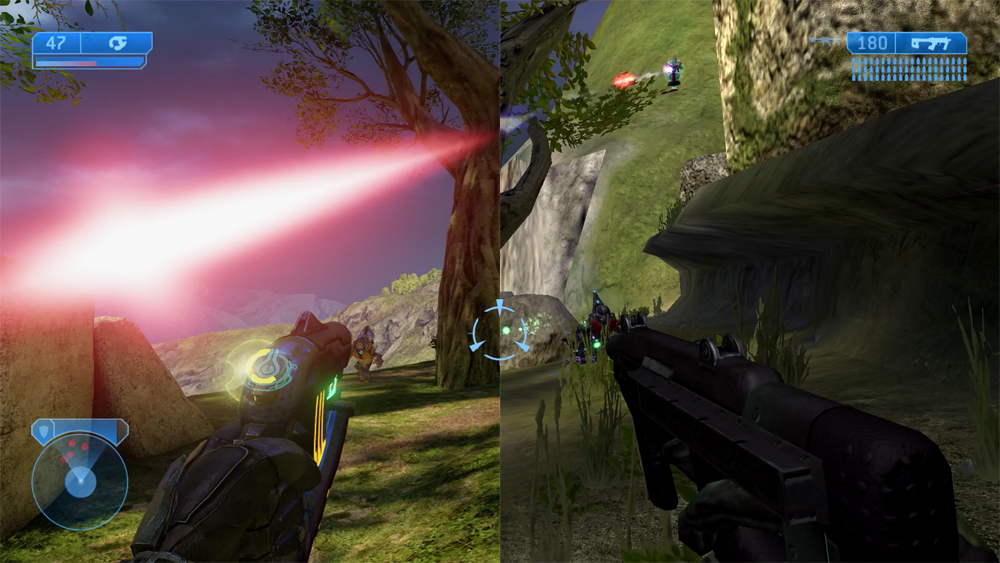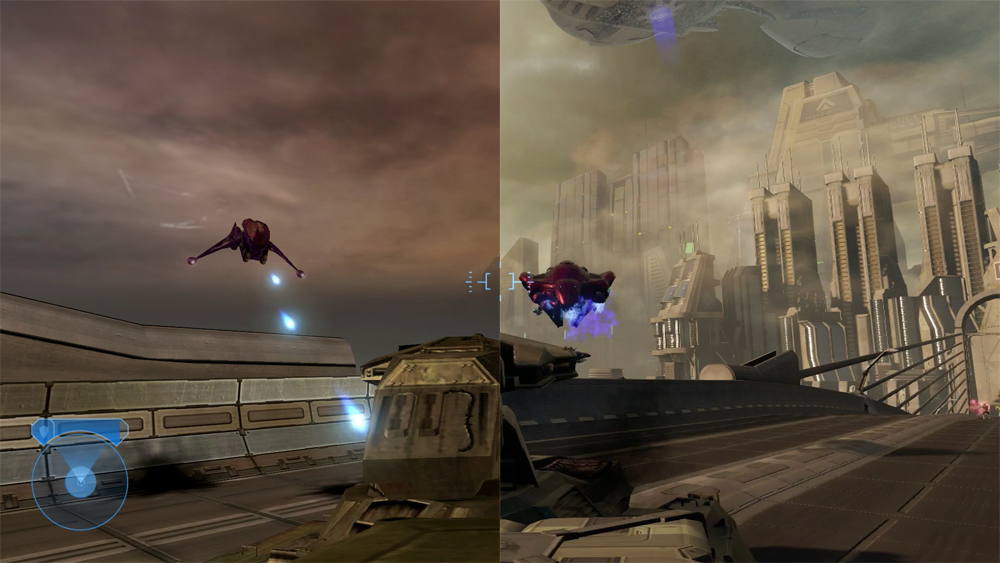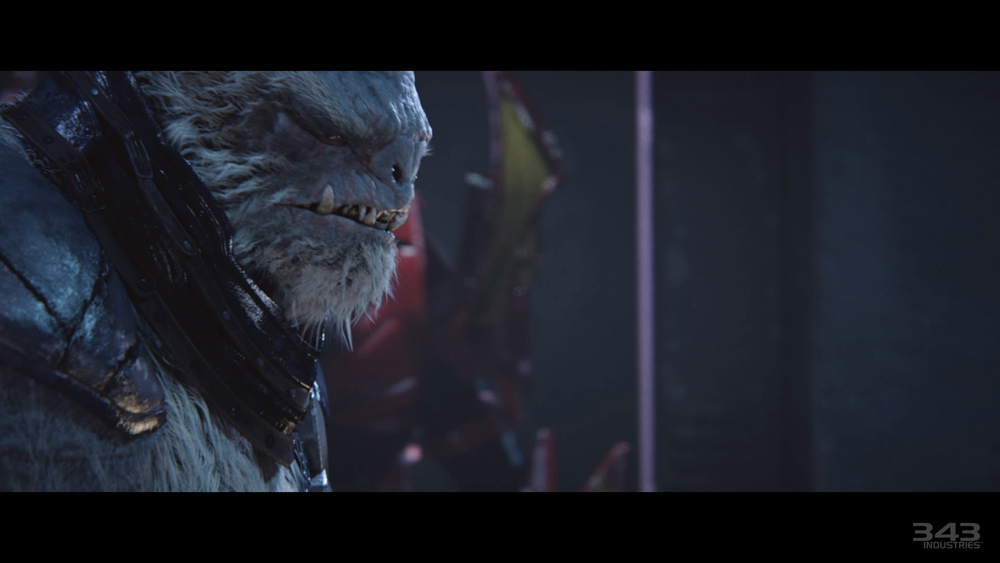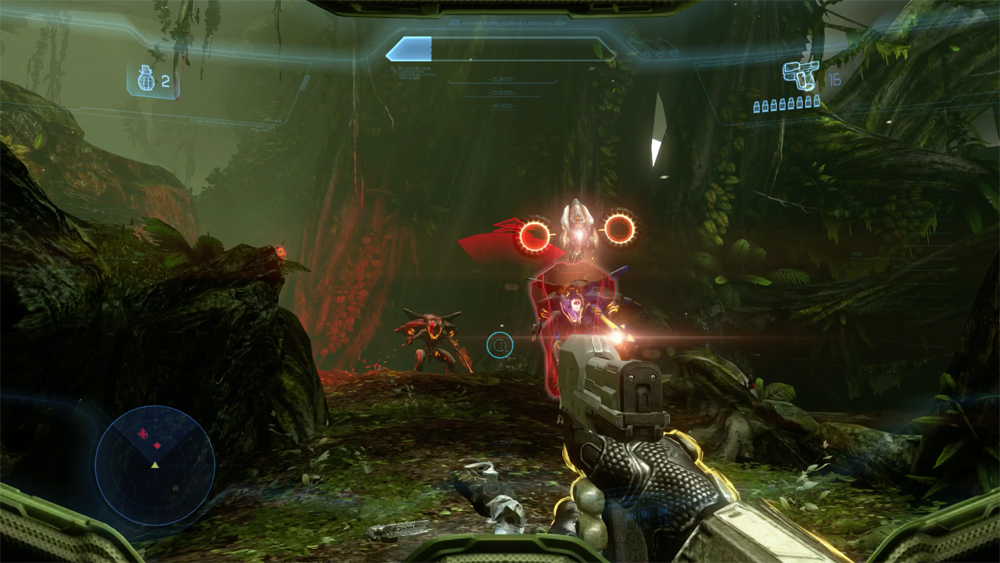This review has some limited story spoilers and focuses on the single-player aspects of Halo: The Master Chief Collection. GamesBeat will run a later review of the multiplayer after release. –Ed.
Check out our Reviews Vault for past game reviews.
The Halo franchise is, in many ways, the lifeblood of the Xbox brand, but on a human level, it means so many personal things to so many people. Whether that’s a cinematic sci-fi epic, the water cooler around which friends gather, or late nights spent forging feuds and friendships in competitive multiplayer, Halo means a decade’s worth of special moments.
Halo: Master Chief Collection is a celebration of all those many moments; it’s part time capsule, part treasure chest. However you choose to experience the saga, 343 Industries and Microsoft Studios have fleshed out every activity you could hope to perform, each element intuitively accessible through a linked universal interface, with new secrets tucked inside. Despite some scarce technical issues and a few bubbles in the remastering ointment, Halo: The Master Chief Collection is as much a complete package as you could ask for, enabling you to rediscover and enjoy the collection however you choose. Whether you’re a lifelong Halo conscript, a tourist with an appreciation, or part of a new generation ready to undertake the journey, this is the definitive version of the first decade of Halo.
What you’ll like
The complete saga to-date, made to order
The core of the content on tap in Halo: The Master Chief Collection is the science fiction epic spanning four complete games. While everyone familiar with the franchise knows the story of Spartan 117, The Master Chief, the collection serves as the absolute best point of entry thanks to the performance bump bringing each campaign up to 1080p resolution at 60 frames-per-second. Admittedly, it’s somewhat alarming to see the over ten-year-old sights of Halo: Combat Evolved unfold at this frame rate, as enemies committed to memory seem sped up and unnaturally fluid at first. But the effect soon fades and the boost in quality melds with the campaign for a smoother experience with cumulative improvements as you progress through the more modern campaigns.
Though I chose to start at the beginning and work my way through the space opera from start to finish, Halo: The Master Chief Collection houses no locked doors: Every mission from every campaign is immediately playable on any difficulty as a cooperative effort or alone. It’s a fantastic decision on 343 Industries’ part that reinforces the idea of celebrating Halo. You won’t need to drudge through The Library — one of the original Halo’s most bemoaned levels — before getting to the points you appreciate. Each mission also supports competitive scoring and time trials in the event you’re looking for an arcade overlay on the traditional experience. You’re free to experience all or some of the story however you please.
In a similar vein, Halo: The Master Chief Collection includes a series of playlists categorized and sub-categorized by level, content, difficulty, and a number of other filters. These playlists allow you to tailor your Halo campaign experience all in one place in a way that’s never before been possible. Say you’ve always been a big fan of the unbridled point-and-kill power of the Scorpion Tank in the Halo campaigns — there’s a playlist comprised entirely of the levels that feature the tank from all four games. Hardened veterans can even undertake the impossible: Every level from every game on Legendary difficult with every skull modifier activated. Dozens of playlists support your freedom of choice, and nearly all of them support cooperative play.
The remastered treatment
Halo 2: Anniversary is in many ways the marquee feature of Halo: The Master Chief Collection. Like the Halo: CE Anniversary’s modernized treatment before, with the touch of a button you’re able to seamlessly transition between the graphics of yesterday and the wholly impressive visual update. The differences are subtle in some areas of the game: The dull earth tones of New Mombasa carry noticeable but limited improvements, for example. However, the greater share of the campaign displays dramatic shifts between dated and new textures and lighting; the differences are more than just night and day, they’re an order of magnitude apart. Natural landscapes, environments with liquid, and the illuminated alien structures of The Covenant beam the most radical differences between qualities, but the entire feat is deftly executed.
And though visuals might be the most obvious piece of the remastered puzzle, the audio has undergone significant improvement as well. One the high points of any Halo game is the reliably fantastic score, and the remastered tunes of Halo 2: Anniversary are no different. Each song carries more substance, a weightier body: bass notes are deeper and lay a stronger foundation while the softer strings dance above it. The trademark vocal performances are as ethereal as ever, with the stronger, piercing chants — like those that echo through the Aztec-like temples of Delta Halo — embodying more soul than the original performances.
It’s impossible not to hear the differences in music when sliding between the two, but the sound effects have also undergone a welcome overhaul: Human weapons crack and pop, while energy weapons buzz and hiss with electric fervor, much improved over the comparatively lethargic stock sounds. And unlike the remastering done to Halo: Combat Evolved, all these changes toggle together with the push of a button, both in-game and in the stunning cutscenes. And it’s with no small amount of praise that these cinematics from Blur Studios should be singled out as perhaps the spotlight of the treatment, brought to life with weapons-grade animation talent that easily rivals anything coming out of Hollywood.
Everything’s connected
Part of the challenge of housing content spread out over so many years is finding a way to bring it all together. Halo: The Master Chief Collection handles this remarkably well with one universal interface that treats each game as its own sub-menu. Linking that all together is a universal player ID that allows you to customize your player tag and emblem and select from over one hundred unlockable hi-res avatars as your player persona across the collection — unifying what could have been a potentially fragmented experience.
You’re also able to set your preferred control scheme for each game, or choose from one of the new but familiar universal control setups that will follow you throughout each game’s campaign and multiplayer. These remove the need to have to constantly acclimated to the functions and features of each game’s controls when bouncing between them.
And part of this universal player ID is an impressive menu tallying your scores, times, and medals earned for each mission. This menu saves all your statistics and records your progress toward certain loftier goals, so you know how close you’ve come to finishing the challenges outlined. Halo: The Master Chief Collection has delivered a fantastic meta experience, where the menus, the customization, and the unlockables are as much of an expression of the franchise as the campaigns themselves.
Hunting the secrets of Halo
Part of that unifying delivery of over a decade of Halo comes in the form of 343 Industries’ impressive array of baked-in extras, bonus content and hidden secrets that have become synonymous with the franchise. Halo: The Master Chief Collection touts a staggering 450 achievements; yet if you’re not particularly concerned with the potential 4,500 Gamerscore attached, some achievements even unlock in-game customization options for your player ID.
These tasks are scattered across every element of the collection, sending you through each campaign, the robust multiplayer suite, and even into the non-gameplay elements. Additionally, 343 Industries has double-downed on the secret climate of Halo. More terminals — hidden nodes that house back story and lore — add context to both the past and future of the franchise, and carry with them subtle hints and secrets themselves. Of course, new skull modifiers join the fray, bringing with them all manner of cruel and unusual ways to punish yourself in-campaign.
What you won’t like
Technical struggles throughout
While the majority of Halo: The Master Chief Collection’s remastered qualities are a resounding success, during some moments the modernization takes its toll. At points in Halo: Combat Evolved Anniversary and Halo 2: Anniversary, noticeable slowdown occurs when too much is happening at any one time. For example, in the original Halo, shooting one Flood sporeling causes it to explode, setting off a chain reaction with any adjacent sporelings and briefly, but severely, crippling the frame rate. Similar particle-driven effects like the Grunt Birthday Party skull modifier — which causes confetti to burst from a Grunt when successfully scoring a headshot — adds a heavy processing draw to already chaotic engagements, causing slowdown. Strangely, these issues only punctuate the first two campaigns and almost completely disappear thereafter.
The other side of that audio/visual coin also carries its own baggage, as sound issues pop up throughout but are most apparent in the audio balancing of Halo 2: Anniversary. Though the remastered soundtrack is generally much louder than the in-game dialogue and regularly drowns it out, the in-game sound effects are much louder still. Killing an elite in melee range can trigger a deafening death rattle, and long strings of gunfire can completely wash out any other sounds. Of course this works to your advantage in some areas, like when the Flood are skulking about with their fear-inducing gurgles and hisses at ridiculous volume, but those times are the exception rather than the rule. Other audio issues are more resilient throughout, like sounds leashing to sections of a level that start or stop when you cross an invisible “loading boundary” or discarded guns getting stuck in geometry and looping an awful racket that sounds like gravel in a blender.
But the much more serious issues are the sparse but certainly apparent crashes and hard locks throughout the collection. On several occasions, immediately finishing a level or trying to access a networked portion of the universal menu would cause the game to freeze and continuously hum the last note playing or just crash and return to the dashboard. In only one case did I ever lose data: Four missions into Halo 2: Anniversary, a crash nullified my progress into the campaign. Fortunately, as every mission is already unlocked, I was able to immediately pick back up. Though these occurrences are extremely rare relative to the amount of time I spent in-game, the half-dozen occurrences warrant mention.
Conclusion
Judging Halo: The Master Chief Collection by its value proposition alone would be a disservice to its quality but, admittedly, speaks volumes about what you can expect. A wealth of content, detail and care went into this package. It doubles as both a nostalgia-soaked box of memories and a centralized home for newcomers to dig into the vast story of Halo. Despite some technical issues that haunt the overall experience, they’re small footnotes, quickly forgotten as the next dramatic bump in the Master Chief’s journey demands your attention. Halo: The Master Chief Collection is, at least for the time being, the definitive Halo experience and well worth that attention.
While we’re not able to provide our in-depth thoughts on the dense multiplayer suite and server-based bonus content included with Halo: The Master Chief Collection just yet; we’ll be providing a comprehensive review once we’ve thoroughly experienced it in a real-world setting. However, if 343 Industries and Microsoft Studios have treated the multiplayer and cooperative component with the same attentive care, you’re very likely to be in great shape.
Score: 91/100
Halo: The Master Chief Collection releases Nov. 11 for Xbox One. The publisher provided GamesBeat with a digital copy of the game for the purpose of this review.
VentureBeat's mission is to be a digital town square for technical decision-makers to gain knowledge about transformative enterprise technology and transact. Learn More
